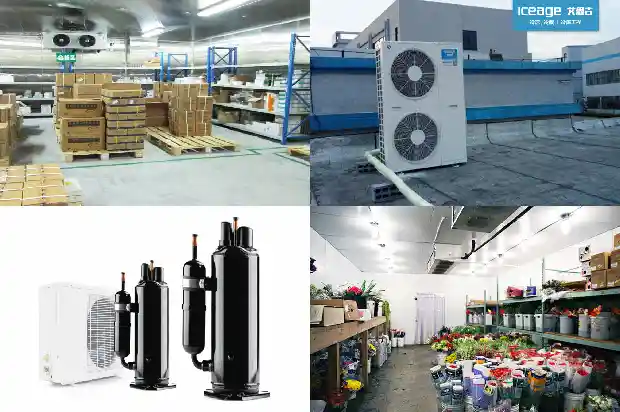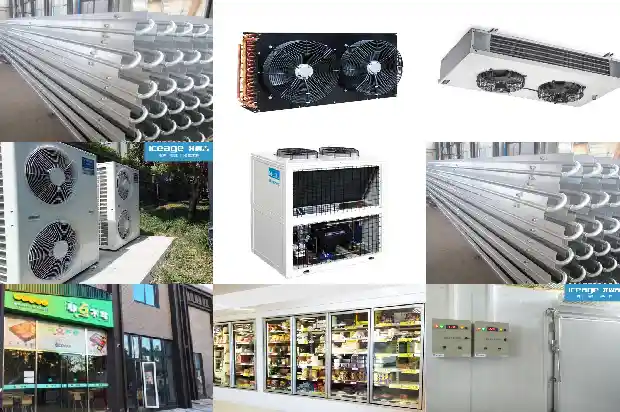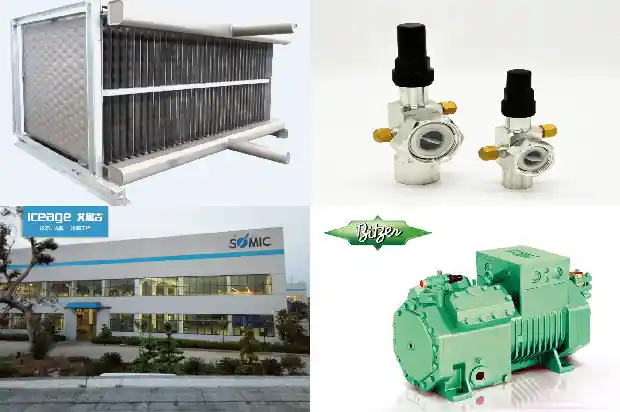The Influence of Temperature Changes on the Air Conditioning Refrigeration System
2025-03-04
The discharge temperature of the air conditioning refrigeration system is closely related to the suction temperature. When the suction temperature rises, the discharge temperature also rises relatively, and vice versa. By understanding their relationship, we can better master and control them, enabling the refrigeration system to operate more effectively.
I. The Influence of Temperature Changes of the Compression Condensing Unit on the Refrigeration System
The temperatures related to the components of the unit all have a normal temperature range. Being outside this range indicates an abnormal state. The factors causing these abnormalities may be faults or incorrect adjustments. In any case, it is necessary to analyze the causes and deal with or check them in a timely manner. These temperature points are difficult to measure with a thermometer and are generally estimated by touch, and then it is determined whether they are normal.
The temperatures related to the components of the unit all have a normal temperature range. Being outside this range indicates an abnormal state. The factors causing these abnormalities may be faults or incorrect adjustments. In any case, it is necessary to analyze the causes and deal with or check them in a timely manner. These temperature points are difficult to measure with a thermometer and are generally estimated by touch, and then it is determined whether they are normal.
- The Influence of Discharge Temperature. In summer, the discharge temperature of the compressor is relatively high, and it is too hot to touch by hand. According to the national standard, the discharge temperature of the R22 refrigeration system should not exceed 150 degrees.
Exceeding this temperature line is an abnormal condition. The reason for the excessively high discharge temperature is either the excessively high suction temperature of the compressor or the excessively high condensation temperature, which must be paid attention to. If the discharge temperature is too low and the exhaust pipe is not hot when touched by hand, it indicates that the suction temperature is extremely low, and the compressor may be operating in a wet stroke or the system is operating with a relatively small amount of working medium. Operating in a wet stroke of the compressor can easily damage the valve structure; operating with an extremely small amount of refrigerant will affect the heat dissipation of the motor winding and accelerate the aging of the insulating material.
- The Influence of the Temperature Change of the Compressor Housing on the Compressor and the Refrigeration System. The temperature field on the outer surface of the housing of a fully enclosed reciprocating piston compressor can be divided into two parts: The upper housing is affected by the suction vapor, and the temperature is relatively low, in the range of slightly warm or slightly cool, estimated to be around 30 degrees. There is a possibility of dew condensation on the local surface of the housing around the suction pipe. The heat generated by the motor in the lower housing and the frictional heat carried out by the refrigeration oil are mainly carried out of the housing by the vapor.
a. The Influence and Causes of an Excessively High Housing Temperature. When the surface temperature of the housing exceeds the normal range, it is mainly due to the excessively high suction temperature (higher than 15 degrees) of the refrigeration system.
When the excessively hot vapor enters the compressor and absorbs the heat inside the housing, it makes the temperature of the vapor even higher, thus causing the temperature of the housing to rise. If the temperature of the superheated vapor rises significantly, the temperature of the housing also rises significantly, which is not conducive to the cooling of the oil. This will affect the lubrication of the moving parts, accelerate wear, and in severe cases, cause the bearing to seize. In addition, it will also cause the discharge temperature to rise.
b. The Influence and Causes of an Excessively Low Housing Temperature. When the surface temperature of the housing is lower than the normal range, the reason is that the suction temperature is too low (lower than 15 degrees). This is beneficial for the cooling of both the refrigeration oil and the motor winding, but the refrigeration capacity decreases to some extent. When the suction temperature is extremely low, most of the housing will be covered with dew, and there is a risk of liquid slugging, which is a fatal blow to the compressor and should be given special attention. At the same time, a large amount of refrigerant is dissolved in the refrigeration oil, which is not conducive to the lubrication of the moving parts.
II. The Influence of Temperature Changes of the Evaporation Unit on the Refrigeration System
- The Surface Temperature of the Thermal Expansion Valve (including the Electronic Expansion Valve) Under normal circumstances, the lower half of the valve body of the expansion valve is very cold, and there is dew, and the sound of the refrigerant flowing is very dull.
Under abnormal circumstances, first, the valve body is relatively cold, there is more dew on the surface, and even frost forms, and the flow sound of the refrigerant is relatively loud (gas flow). The reasons are that the filter screen is blocked and not open, or the refrigerant in the power box leaks, and the valve hole is closed and not open.
- The Temperature of the Capillary Tube Under normal circumstances, the capillary tube is cool and has dew, and there is a sound of liquid flowing. Under abnormal circumstances, first, the surface is very cool and also has dew, but the flow sound is relatively loud, which is gas flow, and the reason is the insufficient refrigerant; second, the surface is not cool, there is no dew, and no flow sound can be heard, and the reason is that the filter screen is blocked or the capillary tube is blocked.
- The Temperature Condition of the Evaporator. Under normal circumstances, the outer surface of the evaporator is very cold, and the condensed water droplets keep dripping down, and the temperature difference between the inlet and outlet air is large. Usually, Δt can be between 12 and 14 degrees. Under abnormal circumstances, the surface of the evaporator is not very cool, there is not much dew, or there is no dew, and a very loud sound of the refrigerant flowing can be heard, and the temperature difference between the inlet and outlet air is small. The reasons are the insufficient amount of refrigerant or the small opening degree of the expansion valve.
III. The Influence of the Ambient Temperature
- The Ambient Temperature Requirements for the Outdoor Unit. According to the national standard, when the ambient temperature is below 35 degrees, the air conditioning unit should ensure normal operation and be able to reach the refrigeration capacity and other indicators marked on the product nameplate. When the ambient temperature is in the range of 35 to 43 degrees, the air conditioning unit can operate, but it cannot guarantee the refrigeration capacity marked on the nameplate. It is already operating at full load, and at this time, the condensation temperature, pressure, and discharge temperature are all quite high. If the heat in the indoor unit is relatively large, the electrical control protector may operate, cut off the power supply, and stop the operation. When the outdoor temperature exceeds 43 degrees, the air conditioning unit is operating under overload, which will lead to the operation of the electrical control protection device, cut off the power supply, and stop the operation.
- The Temperature Requirements for the Indoor Air Conditioner. The highest normal constant temperature value indoors should preferably not exceed 30 degrees. If it operates at a temperature exceeding 30 degrees, the air conditioning unit may be operating under overload conditions. The condensation temperature and discharge temperature of the refrigeration system will rise, and it may also lead to the operation of the electrical protector, cutting off the power supply, which is not conducive to the service life of the air conditioning unit.
- The Heat Pump System. Similar to the single-cooling system, whether the heat pump operates normally mainly depends on checking the working condition of the four-way reversing valve. When the reversing valve changes direction, a relatively loud sound of gas flowing and the impact sound of the solenoid valve thimble (the electromagnetic field attracts the valve core) can be heard. When these two sounds cannot be heard during the reversing process of the solenoid valve, the solenoid valve may be faulty.
Related Articles
- Influence of Fin Spacing of Evaporator in Air Cooler on Frost Formation
- Influence of Condensing Temperature Variation on Vapor Compression Refrigeration System
- Does a lower evaporation temperature result in a larger refrigeration capacity, or does a higher evaporation temperature lead to a larger refrigeration capacity?
- Cause Analysis of High Discharge Temperature and Overload Protection of Modular Units
- Understand Correctly the Dry-bulb Temperature, Dew-point Temperature and Wet-bulb Temperature
- What Misconceptions Should Be Avoided in Low - temperature Refrigeration System Repairs
- Why Does the Evaporation Temperature of the Refrigeration System Drop Too Low? And Why is the Condensing Pressure Too High?
- Introduction to the Advantages of Dual - temperature Cold Storage
- What are the characteristics of low-temperature cold storage?
- Requirements of Cold Storage Insulation for Maintaining Stable Temperature Inside
- Temperature Gradient Differences between Deep Foundation and Surface of Civil Cold Storage
- Temperature Requirements for Various Cold Storages
- Is the heating effect of air source heat pump air conditioner with enhanced vapor injection really good under low temperature conditions?
- 15 Reasons for Excessive Temperature Rise of Motors
- Types and Temperature Requirements of Seed Cold Storages
- Introduction to the Relationship between Refrigerants and Cold Storage Temperatures
- What are the effects of pressure and temperature on the refrigeration system of a cold storage?
- Application of Economizer in Air-cooled Heat Pumps and Low-temperature Screw Compressors
